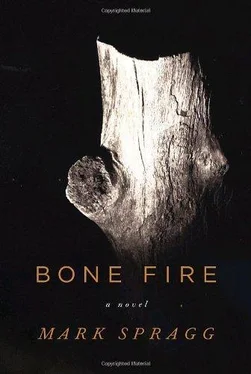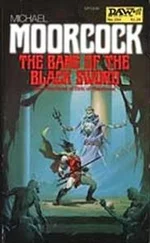He came back with a skull balanced on a palm, its front teeth yellow as beeswax.
“Oh, my God,” she said.
“The whole skeleton’s up by the dams on Horse Creek, but this was all I could bring down without getting bucked off.”
He set it on a round of fir at the edge of the pad and she knelt down to examine it.
“He felled a tree right on top of himself,” he said. “Probably the wind caught it.”
“They’re related to squirrels. Did you know that?”
“Yeah, I did.”
When she got up to check the fire he lay back down in the hammock, nodding off just before dark, and she let him sleep and at midnight lit two white-gas lanterns and hung them under the eaves, and the kiln’s arch and chimney rose up out of the night in the lamplight, shadowed yellow and tan. She stacked in the two-foot lengths of pine, building the fire up all at once. She could hear the flames rushing back through the congestion of shelving and clay and thought of the accretion of fly ash upon the surfaces, the unexpected cocoas, ochres and terra-cotta colorings it would produce. She thought of the women he’d meet. Dark women, city women. She closed the front stokehole and looked back at his sleeping face. He was beautiful. The women would find him beautiful. Of course they would.
At one in the morning she opened the secondary vents a half inch, the mouseholes a quarter, and the fire breathed hotter. When she threw the door back to lay in more wood the flames folded, rushing from her like the burning wings of a dragon.
He raised his head from the hammock. “I’m good to go.”
“I’m fine,” she said. “I’ll wake you later if I’m not.”
He lay back to sleep.
It would be their bodies that knew, she thought, looking away into the darkness to search for the hands, breasts and thighs already dreaming of him. The patches of dampened hair. Sweat ran down her back, so she stripped her top off and wet it in the bucket before pulling it back on. She could hear the fire carrying the alkalies back against the ware, the flames licking out the sideports like bright horns.
At three she opened more vents, snapped on her welder’s goggles and squinted through the spyholes, the flames lean at the rear of the kiln. She eased the damper down and watched them pulse yellow and white, fattening. She could hear the fire moan, hear the women’s laughter bubbling against his body, her wet shirt steaming in the heat.
At four she took up the long-handled poker to stir the firebed, the draft thrown open so the ash and embers could ride the currents of gas and flame, settling more heavily on the ware. And there were the plans they’d made when they were younger, just kids-a family, a home. He shifted in his sleep.
At the five o’clock stoking she singed the hair off her right forearm, standing there watching the pieces shimmer on the top shelves, reflecting in the flamelight. What a fool she’s been. Foolish in love. She rubbed the burned hair from her arm.
She turned the lanterns out at dawn, stacked in as much wood as the firebox would hold and opened the primary vents front and back, knowing that the pieces near the floor, where the oxygen was thinnest, would color purple and maroon. She was short of breath and gasped and watched him turn in his sleep, yawning, then blinking up at her.
“I can do this without you,” she said.
She’d already seen cone six bending at the top back, and increasing the heat at a rate of three hundred degrees an hour will bend cone nine by noon. Tonight cone eleven, twenty-three hundred degrees. She could feel the heat rising inside her. And at midnight, just seventeen hours away, she will make the last stoke and seal up the firebox. Any hotter and the clay could flare and melt, running as though poured from the center of the earth, pooling on the floor of the kiln. That’s when she’ll sleep.
“What time is it?” He dug at his eyes.
She stepped to him, bending down to unbutton his jeans, working them loose from his waist. He arched his hips, wanting to help, and she knelt and took him in her mouth, but he tasted only of ash.
She gripped his hands, pulling him to his feet, and peeled her shorts down to the tops of her steel-toed boots, then fell back across the hammock and opened her legs, her knees winging out, guiding him into her. “The world tastes of ash,” she said.
She shut her eyes.
HE DREAMED it was storming, the overgrown Russian olive at the corner of the house bending eastward in the wind, its topmost branches knocking against the eaves and gutter. He shifted in his half sleep, thinking he might as well get up, have breakfast and prune the tree back later in the day, and then Rodney was standing with his arm cocked against the truck’s side mirror. McEban sat up in the seat, turning the key to put the window down, and Rodney reached a mug of coffee through. He was dressed in his bathrobe and hadn’t yet combed his hair.
“I figured black,” he said.
“Black’s fine.”
McEban blew across the top and took a sip and set the cup up on the dash, where it steamed a section of the windshield. He arched his back.
“If you want to come in I can fix you something to eat.”
“Coffee’ll be enough. Is Kenneth up?”
“Not yet.”
McEban opened the door, sitting sideways in the seat and reaching for his mug. It was just breaking dawn. “How’d he like being in jail?”
“They didn’t put him in a cell or anything like that. But they took his fingerprints, just to make an impression, I guess, and then he sat in a room and drank a Coke with a woman officer until I got over there.” Rodney looked back toward the house, leaning into the side of the truck, scuffing at the pavement with a slippered foot.
McEban stepped into the street. “This is good coffee.”
“Were you out here long?”
“Since about three.” He checked his watch. “It seemed like a waste to rent a motel room for a couple hours, and I wasn’t sure I was going to get to sleep anyway.”
“It was my fault,” Rodney said. “I thought he was having a good time.”
“That’s the problem with good times. They never last like they should.”
A car passed, the driver craning across the seat, glaring at them like they were plotting a crime.
“What time’s he get up down here in the city?”
“About now. I didn’t sleep real well last night either, and then when I looked out I saw your truck.”
“What’s your wife think about all this?”
“I told her about the boy before we ever got married.”
McEban nodded, running his tongue around his mouth. He pulled his Copenhagen out, offering him a pinch.
“I quit.”
“Good for you.”
“She’s always said he was welcome down here. She did from the get-go.”
McEban tossed the can up on the dash and finished his coffee. He handed Rodney the empty cup and they stood staring at it as a train whistled to the west.
“We’ll work something out when he gets a little older. How’s that sound to you? Where he can come down for a visit if he wants. Or next summer you could all come up. We got plenty of room.”
“I’m a chickenshit when it comes to saying no to Rita,” Rodney said. “I wish I wasn’t, but I am.”
McEban sucked on the tobacco, turning his head to spit. “We all are,” he said.
He looked up when they heard the door slam and Kenneth was running across the street toward them without checking for traffic. He rocked McEban back against the edge of the seat, leaning in hard.
Rodney waited for him to get done, then helped him out of his backpack and tossed it over the sidewall onto the truckbed.
“Did you say your good-byes inside?” McEban asked.
Читать дальше












